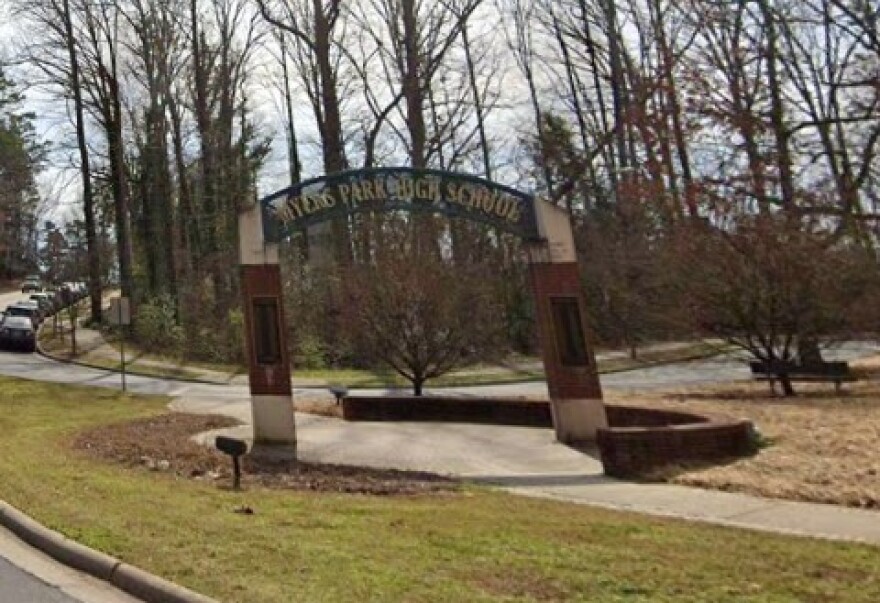Charlotte-Mecklenburg Schools, the city of Charlotte, and a former Myers Park high school student are scheduled go to trial in November. The former student says school and police officials mishandled her report of a sexual in 2015 and in the process violated her Title IX rights.
Meanwhile, the federal judge in the case recently reprimanded CMS and the city and determined both defendants repeatedly failed to comply with the court’s orders in the discovery process. As a result, some of the former student’s attorney’s fees will be covered by CMS and the city. WFAE’s Marshall Terry and Sarah Delia discuss how the case is developing and what might be expected when the trial begins in November.
Marshall Terry: We’ll get into the judge’s sanction of CMS and the city in a moment, but first tell us about this case.
Sarah Delia: This case involves a former Myers Park high student who alleges that when she was a junior in November of 2015, she was forced off campus by a male student and sexually assaulted. The lawsuit filed in 2018, outlines how the plaintiff, says CMS and the police mishandled the incident and how her Title XI rights were violated as a result.
Lawyers for CMS and the city say they acted appropriately based on the information they had. But lawyers for the former student referred to as Jane Doe in court documents, assert school officials and police were unsympathetic and skeptical of Doe’s account and that the MPHS School Resource officer and assistant principal did not do all they could have done to prevent or intervene regarding the assault or follow up to Doe’s report.
Last year, CMS came under fire for its handling of sexual assault allegations ranging from calls to terminate former Myers Park principal Mark Bosco to criticism of former CMS Superintendent Earnest Winston for the district's handling of sexual assault allegations.
Terry: The judge has sanctioned CMS and the city of Charlotte. What did CMS and the city fail to do according to the judge?
Delia: Simply put, CMS and the city did not turn over documents to Jane Doe’s attorneys when they were supposed to — repeatedly.
Because the defendants, in the judge’s opinion, have dragged their feet on producing these discovery materials. Judge Robert Conrad ruled it put Jane Doe’s legal team at a disadvantage.
A sanction is a penalty imposed by the court — that typically includes a consequence. In this case, that consequence is the defendants having to pay the plaintiff's attorneys’ fees in connection with preparing sanction motions.
Terry: What were the records plaintiffs seeking?
Delia: Attorney Laura Dunn told me the documents her team was seeking were records to establish that there was a pattern and practice of minor female students being sexually harmed in the woods adjacent to campus, officials learning about those incidents and not taking any action. Those were both school and police records. Dunn says it’s been a year’s worth of effort to get these documents.
Laura Dunn: My understanding also is that it's exceedingly rare for courts to issue sanctions. A lot is happening during litigation and attorneys have ethical obligations to do their best work with their clients to get all this information turned over. So, when sanctions are issued, something has gone very wrong.
Delia: I also spoke with Julian Wright, an attorney [with Robinson Bradshaw law firm] who has been practicing law for close to 30 years in Charlotte. Wright doesn’t have a connection to this case but he did review Judge Conrad’s ruling. He pointed to the very strong language Judge Conrad uses: “given the entire record in this case the Court finds sanctions are necessary to deter additional non-compliance with the Court’s Orders in this case and others. The Court is frankly tired of Defendants’ gamesmanship in discovery.”
Julian Wright: I think it's an indication of the level of frustration that the court has that the parties weren't able to settle this among themselves and that it required significant court time to be resolved.
Delia: The city has filed objections in the matter. In an email to WFAE city attorney Patrick Baker said it’s “never the intention or in the interest of the City to delay or obstruct the orderly production of discovery material in litigation.” CMPD and CMS both declined to comment on this story.
But we did recently ask School Board member Thelma Byers-Bailey — a retired lawyer — about what her thoughts were on the ruling, particularly with the judge’s use of the word gamesmanship.
Thelma Buyers-Bailey: I beg to differ. I don’t believe, I can’t speak for the county or city or anybody else. But CMS does not believe in gamesmanship. If there was a misunderstanding, then there was a misunderstanding. What thing I've learned in the law is reasonable minds can differ. And just because that’s how that particular judge viewed it... that’s not how everybody should take it.
Delia: But in the judge’s view, it wasn’t just a one-time thing, it was something that had been happening repeatedly.
Terry: What happens next?
Delia: This case is headed for a jury trial in November.
And, attorney Julian Wright points out that’s pretty significant given how many civil matters are settled before they make it to trial these days.
Wright: In this day and age of many, many pretrial motions of mediations and of all sorts of measures of alternative dispute resolution, there simply aren't that many civil jury trials that go forward in our system now as compared to years and decades ago.
Delia: Last week, Jane Doe’s team submitted fees connected to the sanctions — that total amounts to nearly $54,000. Laura Dunn says the next step is preparing for the November trial. And by the time that comes, it will be about four years of litigating this case.






